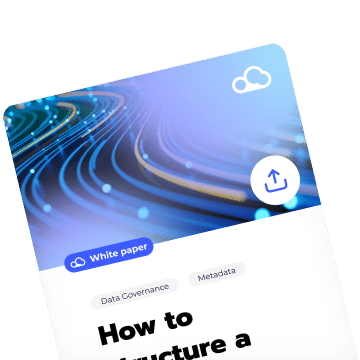DataOps, or data operations, is a modern practice in data management at the crossroads of DevOps and data science. This practice, which is critical to digital transformation and the growth of data-driven companies, provides better data lifecycle management to optimize and improve data quality.
DataOps is designed to improve the collaboration and communication between data engineers, data scientists, and other IT professionals involved in managing data analytics pipelines. The goal of DataOps is to enable organizations to more quickly and reliably deliver data and insights to their users, while also reducing the complexity and cost of managing the underlying data infrastructure.
DataOps: The key to data-driven innovation
DataOps practitioners oversee the end-to-end data pipeline, from the initial data collection and preparation, to the development and deployment of data models, to the ongoing monitoring and optimization of the pipeline. This often involves implementing automated processes and tools to streamline data management, as well as fostering a culture of collaboration and continuous improvement within the organization.
DataOps is an agile approach to designing, implementing, and maintaining a data architecture. It encompasses a wide range of technological tools designed to make the most of big data. It involves both the information systems development team and the operations team (DevOps), along with teams specialized in data processing, including data scientists. Combining these disciplines yields the tools, processes, and organizational structures necessary for data-centric growth.
DataOps’ missions
DataOps improves data flow integration and automation while fostering collaboration between data scientists and the project teams that use that data. These teams, in effect, analyze data that has a practical value that can be measured by the knowledge it provides. DataOps project teams work in response to the changing needs of the customer. These groups organize themselves to achieve specific objectives based on scalability and stability, both for the team and process.
One of the primary responsibilities of DataOps teams is to enable project-scale orchestration of data, tools, environments, and code. Analytical pipelines function in the same way as lean production lines, with a strong emphasis on being able to reproduce results.
Who leads DataOps?
The key roles that lead DataOps include Data Engineers, Data Scientists, and IT professionals.
- Data Engineers: Responsible for designing and implementing the technical infrastructure for data pipelines, including the collection, storage, and preparation of data for analysis. Data scientists are responsible for developing and deploying data models and algorithms and for analyzing and interpreting the data to generate insights and recommendations.
- IT professionals, such as system administrators and DevOps engineers: Responsible for managing the underlying technology infrastructure and ensuring that the data pipeline is secure, scalable, and reliable.
- The executive team, such as the CDO (Chief Data Officer) and the CTO (Chief Technology Officer): Responsible for setting the overall strategy and direction for the organization’s data management practices. This often involves defining the goals and objectives of the data team and establishing the policies and processes that will be used to manage the data pipeline.The executive team is also responsible for providing the necessary resources and support to enable the data team to succeed, such as funding for technology and personnel. Additionally, the executive team may be involved in making key decisions about data-related projects, such as which data sources to use, and which data models and algorithms to deploy.
Together, these roles work closely to collaborate on the end-to-end data pipeline and to ensure that it is optimized to deliver data and insights to users in a timely and effective manner.
Why use DataOps?
While the primary goal of DevOps is to deliver functional software to the business quickly and continuously, DataOps involves the delivery of relevant, functional data to every stakeholder in business processes. To put it another way, DataOps bridges the cognitive, temporal, and organizational gaps that exist between data scientists, business analysts, developers, and anyone who uses data within an organization.
There are several reasons why organizations should consider using DataOps:
- First, it can help organizations to more quickly and reliably deliver data and insights to their users by enabling faster and more efficient collaboration between different teams involved in the data pipeline. This can help organizations to make better and more timely decisions and to stay competitive in an increasingly data-driven world.
- Secondly, it can help organizations reduce the complexity and cost of managing their data infrastructure by implementing automated processes and tools to streamline data management. This can help organizations reduce the time and effort required to maintain their data pipelines and free up IT resources for other tasks.
- Finally, DataOps can help organizations foster a culture of collaboration and continuous improvement by encouraging open communication and collaboration between different teams involved in the data pipeline. This can help organizations to understand the needs of their users better, and to develop more effective and innovative data-driven solutions.
The benefits of DataOps for your business
DataOps skills within your organization help you to:
- Provide real-time data information.
- Accelerate the process of creating data applications.
- Enhance and streamline collaboration for each specialty along the data value chain.
- Improve data transparency, allowing for greater team innovation and collaboration.
- Maximize data quality and reusability.
- Build a collaborative, unified, standardized, and homogeneous data platform.
In short, DataOps responds to new strategic trends in data management, such as the democratization of data use, the diversification of data processing technologies, and their commercial application.
The future of DataOps
It is difficult to predict the exact future of DataOps, as it will depend on various factors such as technological developments and changes in industry trends. However, the use of DataOps will likely continue to grow and evolve in the coming years. Some possible developments in 2023 include:
- The continued integration of DataOps with other IT practices, such as DevOps and Agile, to create a more comprehensive and streamlined approach to data management.
- The development of new and improved tools and technologies for data management, such as machine learning and artificial intelligence, to automate and optimize data pipelines.
- An increased focus on security and privacy as organizations seek to protect sensitive data and ensure compliance with privacy regulations.
- The growing importance of DataOps in enabling organizations to make better and more timely data-driven decisions, in a world where data is increasingly seen as a strategic asset.
- The emergence of new roles and job titles related to data operations, as the practice becomes more widely adopted and the demand for skilled practitioners grows.
—
Interested in learning even more about using your data as an asset to achieve higher levels of data governance and data quality? Book a demo today to get started on your organization’s journey to complete data lifecycle management with DataGalaxy!





